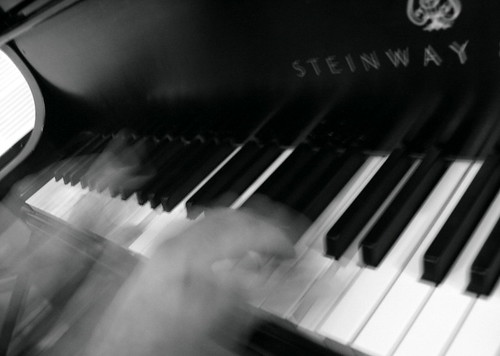 |
| madandon / cc |
Meri's Musical Musings has a very informative post on how to choose an accompanist for your performance, audition, exam, or competition, with best practices for both parents and teachers:
Respect the accompanist’s fee and DON’T BARGAIN WITH THEM; remember, they need to factor in the time you gave them to learn the music (which in one case my husband got was literally the night before, only had an hour to rehearse the music just before the audition, as the candidate’s previous accompanist proved to be inadequate), the time it takes to travel to the rehearsal and performance locations (especially if they are different), the accompanist’s experience, and if the performance and rehearsal locations are easily accessible by public transit or not.This is useful advice for teachers hiring a pianist for their entire studio:
Another thing if you are a teacher when you have a number of students working with the same accompanist: collect the money from each student or parent first, instead of asking each student or parent to pay the accompanist directly, which you then give the money collected from each student to the accompanist on the day of the first rehearsal. Otherwise, you run the risk of the students not showing up, or forgetting to pay the accompanist, or the students running into the next session if they show up late, or losing a bunch of cash or cheques.What else would you recommend as better ways for performers, parents or teachers to hire a pianist?
As an accompanist, I think word of mouth works very well, especially in last-minute situations (it's jury time for many colleges that in session!).
ReplyDeleteThe final decision should be left to the performer, but the teacher can certainly assist with some suggestions.
Agreed. Word of mouth is EVERYTHING.
DeleteI would like to share my Venezuelan Piano Sheet Music Compilation that I think is a good tools for students, have a nice day
ReplyDeletehttp://pianovenezolano.blogspot.com
Thanks Eleoner!
DeleteGood advice! I posted about this general topic a couple months ago:
ReplyDeletehttp://madtownmama.blogspot.com/2014/02/helpful-hints.html
Thanks Suze! Those are great hints.
DeleteYes it's true a piano is not easy ..
ReplyDeleteto more practice then you get more in musical instrument all are need more practice ..
thanks for sharing
Always bring a copy of the music with you. Not all accompanists keep photocopies of the same aria - and you certainly don't want the accompanist to play all the phrases with the same amount of rubato/accelerando as they did back in 1998 when they last played the same aria. Double sided/taped singles, clean, and neatly hole punched is fantastic.
ReplyDeleteAs well, arrive to coachings/rehearsals with music learned. I have a protocol: The words "Could you play my line for me?" will often inform me that you don't know your music. I will send you home with a warning (and perhaps a trump card for that wasted coaching) - go home and learn your music. If you schedule the next coaching, and no progress is made, I charge for the wasted coaching, and DOUBLE for the second one. Any subsequent note "bashing" will result in a double charge. Mistakes are understandable; But not having your music learned is unfair to everyone. It is as bad as going to math class without homework done and then expecting your teacher/tutor to do it for you.
- JY
If someone wishes to have a quality performance, I believe requesting for a accompanist well in advance is key. Nothing is worse than being asked to accompany a difficult work, such as the Franck sonata for violin and piano, the day before/of the performance, and panicking to learn the music.
ReplyDelete